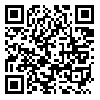BibTeX | RIS | EndNote | Medlars | ProCite | Reference Manager | RefWorks
Send citation to:
URL: http://jdm.tums.ac.ir/article-1-255-en.html
Background and Aim: Extensive studies on the epidemiology of teeth and oral diseases are an important part of health care programs specially for hearing impaired groups. For adequate programming in this field, proper situation analysis is mandatory. The aim of this study was to assess the DMFT (decayed missed filled teeth) of 12 years old students attending hearing impaired schools in Tehran and exploring the relation between sex, hygiene and hearing threshold with the index.
Materials and Methods: This cross sectional descriptive study was based on examining 12 years old (± 6 month) students (117 cases) attending hearing impaired schools in Tehran. A questionnaire was filled for each case. T, Chi-square and Kruskall-Wallis tests were used to analyze the results with p<0.05 as the limit of significance.
Results: The mean DMFT in these students was 3.07. Mean DMFT in students with very severe hearing loss was 2.99. Mean ranked DMFT in girls and boys was similar (56.09 in boys and 61.96 in girls). Mean ranked DMFT in students who didn’t use floss (66.40) was higher than those who used floss (46.71). Mean ranked DMFT in students who seldom brushed, was the highest (72.82) and in students who brushed once a day was the lowest (51.26).
Conclusion: The DMFT index in hearing disabled children was 3.07. Regular brushing and flossing reduced the index.
Received: 2005/08/2 | Accepted: 2006/07/4 | Published: 2013/08/18
| Rights and Permissions | |
 |
This work is licensed under a Creative Commons Attribution-NonCommercial 4.0 International License. |




